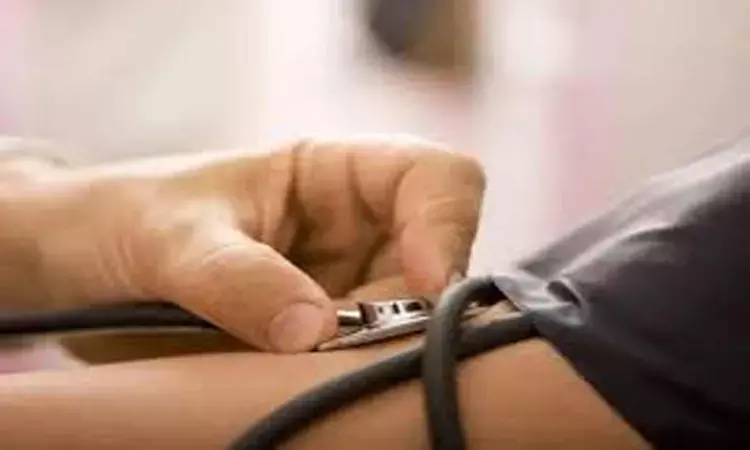- Home
- Medical news & Guidelines
- Anesthesiology
- Cardiology and CTVS
- Critical Care
- Dentistry
- Dermatology
- Diabetes and Endocrinology
- ENT
- Gastroenterology
- Medicine
- Nephrology
- Neurology
- Obstretics-Gynaecology
- Oncology
- Ophthalmology
- Orthopaedics
- Pediatrics-Neonatology
- Psychiatry
- Pulmonology
- Radiology
- Surgery
- Urology
- Laboratory Medicine
- Diet
- Nursing
- Paramedical
- Physiotherapy
- Health news
- Fact Check
- Bone Health Fact Check
- Brain Health Fact Check
- Cancer Related Fact Check
- Child Care Fact Check
- Dental and oral health fact check
- Diabetes and metabolic health fact check
- Diet and Nutrition Fact Check
- Eye and ENT Care Fact Check
- Fitness fact check
- Gut health fact check
- Heart health fact check
- Kidney health fact check
- Medical education fact check
- Men's health fact check
- Respiratory fact check
- Skin and hair care fact check
- Vaccine and Immunization fact check
- Women's health fact check
- AYUSH
- State News
- Andaman and Nicobar Islands
- Andhra Pradesh
- Arunachal Pradesh
- Assam
- Bihar
- Chandigarh
- Chattisgarh
- Dadra and Nagar Haveli
- Daman and Diu
- Delhi
- Goa
- Gujarat
- Haryana
- Himachal Pradesh
- Jammu & Kashmir
- Jharkhand
- Karnataka
- Kerala
- Ladakh
- Lakshadweep
- Madhya Pradesh
- Maharashtra
- Manipur
- Meghalaya
- Mizoram
- Nagaland
- Odisha
- Puducherry
- Punjab
- Rajasthan
- Sikkim
- Tamil Nadu
- Telangana
- Tripura
- Uttar Pradesh
- Uttrakhand
- West Bengal
- Medical Education
- Industry
No impact of dapagliflozin on short-term BP variability in diabetics: Study

Greece: The use of SGLT2 inhibitor dapagliflozin does not affect short-term blood pressure variability (BPV) in type 2 diabetes (T2D) patients, suggests a recent study in the American Journal of Hypertension.
Increased BPV is known to increase the risk of cardiovascular and all-cause mortality in T2D patients. Sodium-glucose-co-transporter-2 (SGLT-2) inhibitors decrease the incidence of death, cardiovascular events, and renal events in this population. This study by Pantelis Sarafidis, University of Thessaloniki, Hippokration Hospital, Thessaloniki, Greece, and colleagues aimed to evaluate the effect of dapagliflozin on short-term BPV in T2D patients.
For the purpose, the researchers performed a secondary analysis of a double-blind, randomized, placebo-controlled trial in 85 T2D patients. The subjects were randomized to receive oral dapagliflozin 10mg once daily or placebo for 12 weeks. The patients underwent 24-h ambulatory blood pressure (BP) monitoring with the Mobil-O-Graph NG device at baseline and study-end. With the use of validated formulae for the 24-h and the daytime and nighttime periods, the researchers calculated Standard-deviation (SD), weighted-SD (wSD), coefficient-of-variation (CV), average-real-variability (ARV) and variation-independent-of-mean (VIM).
Key findings of the study include:
- Dapagliflozin reduced 24-h brachial BP compared to placebo. From baseline to study-end 24-h brachial BPV indexes did not change with dapagliflozin (SBP-ARV: 11.51±3.45 vs 11.05±3.35; SBP-wSD: 13.59±3.60 vs 13.48±3.33) or placebo (SBP-ARV: 11.47±3.63 vs 11.05±3.00; SBP-wSD: 13.85±4.38 vs 13.97±3.87).
- Similarly, no significant changes in BPV indexes for daytime and nighttime were observed in any group.
- At study-end, no differences between the groups were observed for any BPV index.
- Deltas(Δ) of all indexes during follow-up were minimal and not different between-groups (SBP-wSD: dapagliflozin: -0.11±3.05 vs placebo: 0.12±4.20).
"This study is the first to evaluate the effects of an SGLT-2 inhibitor on short-term BPV in patients with T2DM, showing no effect on dapagliflozin on all BPV indexes studied," concluded the authors.
The study, "Dapagliflozin does not affect short-term blood pressure variability in patients with type-2 diabetes mellitus," is published in the American Journal of Hypertension.
DOI: https://academic.oup.com/ajh/advance-article-abstract/doi/10.1093/ajh/hpaa207/6024653
Dr Kamal Kant Kohli-MBBS, DTCD- a chest specialist with more than 30 years of practice and a flair for writing clinical articles, Dr Kamal Kant Kohli joined Medical Dialogues as a Chief Editor of Medical News. Besides writing articles, as an editor, he proofreads and verifies all the medical content published on Medical Dialogues including those coming from journals, studies,medical conferences,guidelines etc. Email: drkohli@medicaldialogues.in. Contact no. 011-43720751


